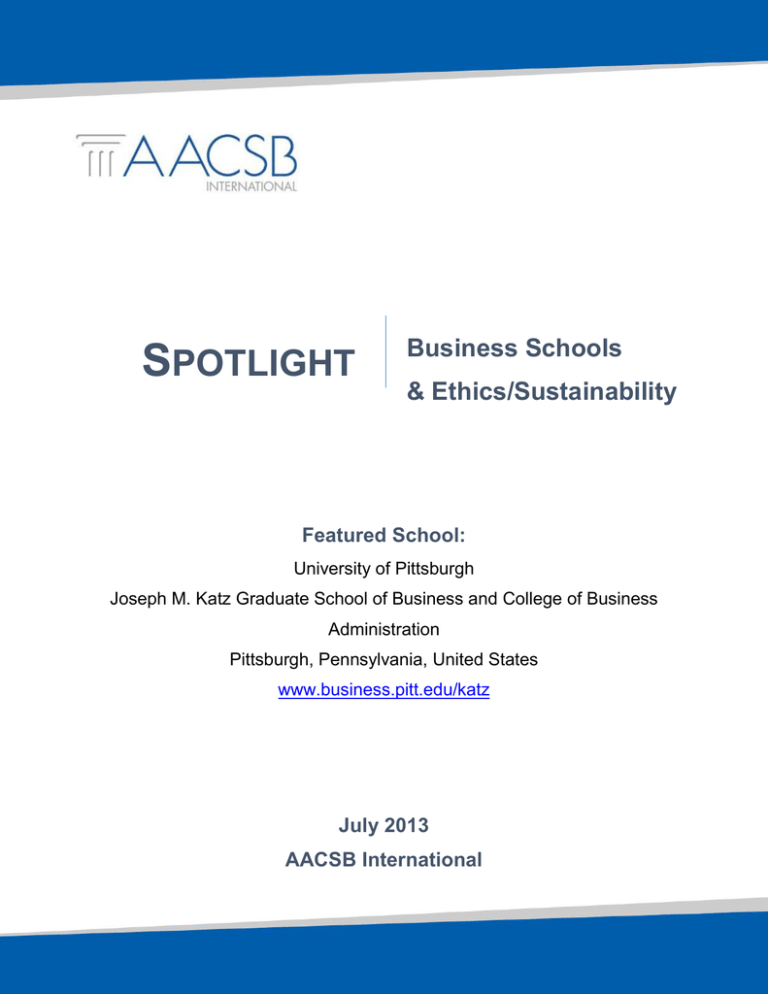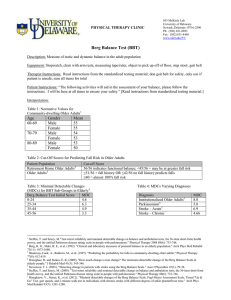
SPOTLIGHT
Business Schools
& Ethics/Sustainability
Featured School:
University of Pittsburgh
Joseph M. Katz Graduate School of Business and College of Business
Administration
Pittsburgh, Pennsylvania, United States
www.business.pitt.edu/katz
July 2013
AACSB International
SPOTLIGHT | Business Schools & Ethics/Sustainability
Joseph M. Katz Graduate School of Business | 2
David Berg Center for Ethics and Leadership
In 1999, the David Berg Center for Ethics and Leadership at the University of Pittsburgh, Joseph M. Katz
Graduate School of Business and College of Business Administration was created through a gift from
David Berg, alumnus of the University of Pittsburgh. From its onset, the mission of the Center was to “add
value to organizations through ethical leadership.” 1 The Center’s activities focus on “creating and utilizing
knowledge through cutting-edge research, experience-based teaching, and active community
engagement.”2 Audrey Murrell, associate dean of the College of Business Administration, associate
professor of business administration at the Katz Graduate School of Business and College of Business
Administration, and director of the school's David Berg Center for Ethics and Leadership, explains the
Berg Center approach, where strong academic programs, innovative research initiatives, and effective
external partnerships all fuel the success of the Center’s goals for teaching students how they can add
value to organizations through ethical leadership.
Academic Programs at the Berg Center
The Berg Center credits much of its success to having a strong portfolio of programs and activities that
align with the needs and interests of undergraduate and graduate students, as well as corporate and
community partners. One of the Center’s most established and notable programs is the Certificate
Program in Leadership and Ethics (CPLE), currently in its tenth year. Murrell explains that the Berg
Center offered a foundation for the coordination of the CPLE: “Rather than structured departments, we
have broad, combined areas at the business school. Therefore, it was necessary to be able to create a
more solid infrastructure that would support greater interdisciplinary collaboration and coordination of the
CPLE.”
The CPLE was designed to strengthen the undergraduate Bachelor of Science in Business Administration
program at the School by requiring participating students to complete 6 courses/ 16 credits of work
related to ethics and leadership. The program is cohort-based and students experience the program
together over a period of three years in which they develop a peer network. Sophomore business
students must apply to participate in the certificate program, which begins in the fall term. The Program’s
leaders look for students who show interest and/or experience in leadership roles, interest in ethics and
social responsibility, strong academic achievement, and willingness to be active in group projects. The
Program looks to admit 20-25 students each year.
The guiding principle that “Leadership and ethics must be considered together” forms the basis of the
Program’s curriculum.3 Students are exposed to this belief through a number of meaningful and
experience-based activities related to ethics and leadership in various organizational settings, in addition
© AACSB International. All Rights Reserved.
SPOTLIGHT | Business Schools & Ethics/Sustainability
Joseph M. Katz Graduate School of Business | 2
to the required coursework. The key components comprising the Program are extracurricular support, cocurricular enhancements, and curricular components – all which aim to develop the following five core
competencies in students:
1. Relational leadership
2. Ethical decision making
3. High impact communication
4. Project team management
5. Civic/social engagement
An experiential learning approach is central to the Katz School and College of Business Administration,
and therefore is central to CPLE. Students gain experience in leading projects, peers, and teams,
experience in cross-functional coordination, stakeholder management, and the essentials of project
management.4 Students are required to complete at least one internship experience while in the program.
Murrell adds that CPLE students have a strong record of achievement in internships, including with
organizations such as PNC Bank, PricewaterhouseCoopers (PwC), and Deloitte. The experiential and
internship experience that students gain during the program has helped many students secure full-time
job offers upon graduation.
Murrell and Ray Jones, clinical assistant professor of business administration and coordinator, Certificate
Program in Leadership and Ethics, explain: “Our approach is that in order to understand leadership and
ethical leadership, students need an experience. This cannot be done with lecture alone. We have seen
this in the past ten years from tracking the learning that they've done over time. The learning comes when
the content they learned during lecture comes to life during application. We wouldn't get this accelerated
learning without the hands-on component.” Further, the Center is very selective as to what projects
students take on and makes sure that the students get a useful experience and one that is appropriate to
their level of business acumen.
The Berg Center is also home to a handful of other certificate programs, including:
Certificate in Organization Leadership and Ethics (COLE) delivered in partnership with the
University of Pittsburgh Human Resource Department. The program comprises a series of six
workshops that are designed for faculty and staff who are supervisors or administrators and who
want to maximize their ability to have impact as ethical leaders within their unit/department or
overall workplace.”5 The workshop series develops ethical leaders through a combination of
knowledge, interactive discussion, and skill-building exercises. The program attempts to reach
employees in leadership roles across the University system, including executive administrators,
directors, associate directors, faculty, assistant deans, financial administrators, program
managers, and department administrators.
© AACSB International. All Rights Reserved.
SPOTLIGHT | Business Schools & Ethics/Sustainability
Joseph M. Katz Graduate School of Business | 2
Certificate in Organizational Leadership is part of the MBA curriculum, requiring part-time and
full-time students to take 10.5 credits across a series of approved courses. The “intense
leadership-building experience” provides students with the knowledge and experience required to
understand the “complexity of leadership within the broad context of business and society.” 6
Certificate in Ethical Leadership in Business and Society is a certificate course held in the
summer term that is designed for University of Pittsburgh students outside of the College of
Business Administration who have an interest in ethics and leadership. Any student with “an
interest in engaging in lively discussion of the interesting ethical challenges of leadership” and
“gaining focus in leadership and ethics in their studies and in their professional development” may
apply for admission to the course.
7
Experiential Learning
The Berg Center offers two distinct fellowship programs at the MBA level, both of which give students the
opportunity to solve strategic management problems facing organizations. The BNY Mellon Corporate
Social Responsibility (CSR) Fellows program, offered through a gift that the company's foundation made
to the university, gives teams of students the opportunity to assess the CSR practices of Western
Pennsylvania businesses, government agencies, and not-for-profits. Past teams have analyzed the fuel
management practices of Allegheny County and the CSR reporting practices of Magee Women’s Hospital
of UPMC. Through the Kenneth R. Woodcock Fellows program, offered through a generous gift of an
alumnus, teams of students are embedded into the boards of directors of not-for-profit organizations,
including arts groups and economic development organizations. A past team helped a community
development organization with marketing a new park that offered postcard-perfect views of the City of
Pittsburgh.
As mentioned earlier, students are also expected to participate in a number of extra-curricular activities,
including ethics case competitions. The annual “Berg Cup” is hosted and administered by the University
of Pittsburgh Chapter of Phi Beta Lambda and the Berg Center. Every spring, undergraduate business
students from across the country compete for a cash prize and the recognition of having their school's
name engraved upon the Berg Cup trophy.8 The case competition focuses on ethics, leadership,
sustainability, and corporate social responsibility (CSR) topics. For example, the focus of the 2013 case
competition was “CSR and Measuring Impact.” The Berg Center also hosts other ethics-related
competitions, including The Great Case® in which teams of graduate students from academic
backgrounds in law, public policy, and business are given a case study centered on fiduciary ethics
© AACSB International. All Rights Reserved.
SPOTLIGHT | Business Schools & Ethics/Sustainability
Joseph M. Katz Graduate School of Business | 2
issues and must solve various challenges and race to multiple locations on the University of Pittsburgh
campus9.
The Berg Center is also involved in the Pittsburgh Business Ethics Award (co-hosted with Pittsburgh
chapter of the Society of Financial Service Professionals [SFSP]), which honors U.S. businesses that
demonstrate a strong commitment to ethical business practices.10
Research Activities
To complement the learning opportunities and experiences it provides students, the Berg Center
“supports ongoing research that addresses issues of social responsibility, ethics, leadership, and
sustainability both locally and globally.”11 Research projects include issues of cause marketing,
environmental sustainability, corporate corruption, leadership effectiveness, and ethical decision making.
The Center also provides support for doctoral student research projects focused on corporate social
responsibility, and through a grant from Bank of New York Mellon, faculty fellows are supported to
conduct ongoing research on corporate social responsibility across all disciplinary areas. Further, the
Berg Center sponsors undergraduate research projects that connect students with faculty on new and
ongoing ethics-related projects.
Other research projects and initiatives at the Berg Center include the Socially Responsible Investment
Club where CPLE student members undertake a project that examines the impact and parameters of
socially responsible financial investing. Students learn about the connection between a firm's
performance and its ethical business practices, as well as become better aware of the “importance of an
individual's fiscal responsibility and financial stewardship.” 12 Student teams meet regularly to discuss
criteria for social responsibility, often times holding their discussions in the school's Financial Analysis
Laboratory, which offers real-time data and access to financial information.
Additionally, the Berg Center has developed a scorecard called the Food Abundance Index (FAI) that
measures food security within a neighborhood or geographic area: “The index was created to determine
the access to and availability of healthy, nutritious, and culturally appropriate food and to eliminate ‘food
deserts’ - areas where healthy, affordable food is difficult to obtain.” 13 The FAI examines food security
against five criteria: access, diversity, quality, density, and affordability from which a report is composed
and made available through the Berg Center. The report provides an “overview of the FAI scorecard to
help individuals, communities, and regions lay the foundation for improving food security and raising
communities' economic status, health, and overall wellbeing.” 14 The Center is also involved in offering a
toolkit and training workshops to aid in the elimination of food deserts.
© AACSB International. All Rights Reserved.
SPOTLIGHT | Business Schools & Ethics/Sustainability
Joseph M. Katz Graduate School of Business | 2
Best Practices
Both Murrell and Jones credit much of the Center’s success to its strong partnerships across the
university and with alumni and corporate partners. Along with supporting faculty champions, keeping
these groups engaged in the Center's projects and activities leads to success. The Center conducts
numerous repeat projects with clients, and the Center’s close work with the director of alumni relations,
Jim Waite, has allowed for strong alumni engagement. This also opens doors for financial support of the
Center’s programs and activities, as well as potential projects, internships, and learning opportunities that
students can be involved in. For example, the Center received support for projects focused on corporate
social responsibility from the Bank of New York Mellon Foundation. This partnership provides support for
student projects, faculty research and collaboration among employees throughout the organization.
To manage the Center’s portfolio of programs and their development, an external advisory board was
developed roughly two years ago, which exists in addition to its internal faculty committee that reviews all
centers within the school and provides regular feedback. In the future, the Berg Center is looking to ways
it can expand its global reach through partnerships with other schools to collaborate with on global
projects focused on ethics and leadership.
Acknowledgements: AACSB International is grateful for the assistance of Audrey Murrell, associate dean
of the College of Business Administration, associate professor of business administration at the Katz
Graduate School of Business and College of Business Administration, and director of the school's David
Berg Center for Ethics and Leadership, and Ray Jones, clinical assistant professor of Business
Administration and coordinator, Certificate Program in Leadership and Ethics.
© AACSB International. All Rights Reserved.
SPOTLIGHT | Business Schools & Ethics/Sustainability
Joseph M. Katz Graduate School of Business | 2
End Notes
1
University of Pittsburgh, Katz Graduate School of Business (2013) “David Berg Center for Ethics and Leadership”
page, http://www.business.pitt.edu/katz/berg, accessed on May 31, 2013
2
David Berg Center for Leadership and Ethics (2013) “About the Center” webpage,
http://www.business.pitt.edu/katz/berg, accessed on July 9, 2013.
3
David Berg Center for Leadership and Ethics (2013) “Certificate Program in Leadership and Ethics” webpage,
http://www.business.pitt.edu/katz/berg/programs/cple.php, accessed on July 9, 2013.
4
Presentation
5
David Berg Center for Leadership and Ethics (2013) “Certificate in Organizational Leadership and Ethics (COLE)”
webpage, http://www.business.pitt.edu/katz/berg/programs/cole.php, accessed on July 10, 2013
6
David Berg Center for Leadership and Ethics (2013) “Organizational Leadership Certificate” webpage,
http://www.business.pitt.edu/katz/berg/programs/orgcert.php, accessed on July 10, 2013
7
The PITT Summer Edge (2013) “Ethical Leadership in Business and Society” webpage,
http://www.summeredge.pitt.edu/programs/business.php, accessed on July 10, 2013.
8
David Berg Center for Leadership and Ethics (2013) “Berg Cup Case Study Competition” webpage,
http://www.business.pitt.edu/katz/berg/competitions/bergcup/index.php, accessed on July 10, 2013
9
David Berg Center for Leadership and Ethics (2013) “The Great Case®” webpage,
http://www.business.pitt.edu/katz/berg/competitions/greatcase/index.php, accessed on July 9, 2013
10
David Berg Center for Leadership and Ethics (2013) “Pittsburgh Ethics Award “ webpage,
http://www.business.pitt.edu/katz/berg/competitions/pittsburgh/index.php, accessed on July 9, 2013
11
David Berg Center for Leadership and Ethics (2013) “Research Initiatives” webpage,
http://www.business.pitt.edu/katz/berg/research, accessed on July 10, 2013
12
David Berg Center for Leadership and Ethics (2013) “Socially Responsible Investment Club” webpage,
http://www.business.pitt.edu/katz/berg/research/investment.php, accessed on July 12, 2013
13
David Berg Center for Leadership and Ethics (2013) “Food Abundance” webpage,
http://www.business.pitt.edu/katz/berg/research/abundance.php, accessed on July 12, 2013
14
David Berg Center for Leadership and Ethics (2013) “Food Abundance” webpage,
http://www.business.pitt.edu/katz/berg/research/abundance.php, accessed on July 12, 2013
© AACSB International. All Rights Reserved.





